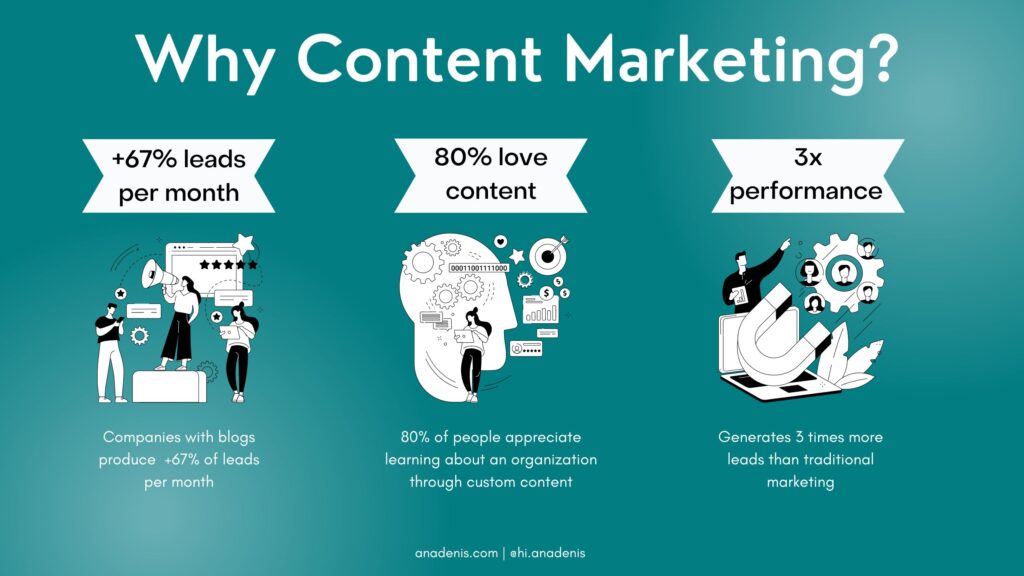Every Youtube shorts video, blog post, or Instagram picture is a part of your content marketing strategy. This quick guide on content marketing for beginners will discuss what’s content marketing, what are its benefits, and why you need to make use that you’re leveraging the strategy for your business.
Content Marketing Definition: What is Content Marketing?
If you’re lost in the world of marketing due to countless concepts, we don’t judge you. Here’s a definition of content marketing that I personally like:
Content marketing is a strategic marketing approach focused on creating and distributing valuable, relevant, and consistent content (articles, videos, podcasts, etc) to attract and retain a clearly defined audience — and, ultimately, to drive profitable customer action.
This definition of content marketing highlights the most important aspects. It’s not enough just to create any content, it must be valuable and relevant. And it’s crucial to have a system in place for consistent content production. Assuming you have a great product, when you hit all 3 content marketing requirements, it will become a digital goldmine that can generate a shameless amount of leads and sales.
Content marketing is a type of inbound marketing that has become increasingly important as businesses migrated online in 2020. Instead of focusing on your products or services, which are great of course but not always relevant for your audience, you’re focusing on solving the pains and issues of your target audience, building trust, rapport, and ultimately loyalty.
Why Is Content Marketing Important?

First of all, long gone are the times when prospective bought off your store or your website
Various pieces of research show that nowadays a potential customer needs at least 8-10 touchpoints with your business before they make a purchase. That’s at least 10 types of different content that will help them to get expertise on the topic, and make a decision.
The stakes are even higher for high-check products. Typically, the more you charge for your products and services, the more research is needed for a potential buyer to justify spending it on your services.
Here’s why you might want to seriously consider developing a solid content marketing strategy, according to the Demand Metric research:
- 90% of organizations market with content
- 80% of people appreciate learning about an organization through custom content
- 70% of people would rather learn about a company through an article than an advert
- 78% perceive a relationship between them and the company using custom content
Therefore, if you’re not using content marketing or using it without a proper strategy, you might be missing out on building a solid online presence and scaling your business.
Benefits of Content Marketing
As a result, the long-term content marketing benefits are:
- Makes you visible and unique. The first thing people see about you online is some piece of content. It can help them to fall in love with your company or never visit your resources again before they even consider purchasing from you. You can start by educating your audience about a topic they’re interested in.
- Generates leads and sales. To sell more of your products and services, you need people to trust you. Content marketing creates and nurtures your relationships with potential customers. Using a content marketing strategy, you can develop trusted relationships with your customers.
- Boosts loyalty. Content is king, we know. The only thing omitted here is ‘great’. Great content is king. It’s also very hard to find. Once your customers know that your content is top-notch, they’ll be back for more.
- Builds thought leadership. The more value your content brings, the more chance there is that you can become a thought leader. Consistent high-quality content will gradually bring recognition from your peers.
How Content Marketing Works
Content marketing can help you to dramatically increase sales if it’s aligned with the stages of your customer’s journey. Make sure your content covers a variety of intents.
Stage 1: Awareness
To run a business, you need to connect with your audience via some form of content. Getting the attention of your potential buyers is the primary task of the awareness stage. From the buyer’s perspective at this stage, they may not even realize that they have a problem or a need. They are not ready to hear any offers or learn about you in particular, and they’re mainly investigating the field.
Let’s say you’re a surgeon and have a practice. Not everyone needs an operation right now. Much more people are just investigating whether they would want some types of surgeries to be done somewhere down the road. They’re interested to know about their options, like whether surgery is the only solution for their issue. The risks, of course.
Thus, the best content type at this stage is educational. Be on their side. Helping your potential buyers to understand the field and make the decision gives you the best chance of engaging with them. Some content types you can consider at this stage are blog posts, videos, e-books, videos, and newsletters.
Stage 2: Consideration
In the consideration stage, content should offer a hybrid of helpful information and marketing. It should educate the reader about what features or functions to look for and how various features address their needs. Of course, your content should lean toward what your business offers.
The best content for this stage includes case studies, product videos explaining the benefits, how-to articles, research reports and checklists.
Your goal at this stage is to stay top of mind when it will be time to make a purchase. Anything that will
Stage 3: Sale
Whenever a person is about to make a purchase, they mostly make the final decision base

